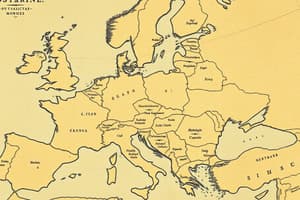Podcast
Questions and Answers
Which of the following was a key factor in medieval society?
Which of the following was a key factor in medieval society?
- Education
- Religion
- Land ownership (correct)
- Trade
What did the saying 'manners maketh man' imply in medieval times?
What did the saying 'manners maketh man' imply in medieval times?
- Manners were the foundation of many societies (correct)
- Etiquette was important
- Only the wealthy and noble could own land
- Land ownership defined political power
What was the relationship between landowner and land workers in the manner system called?
What was the relationship between landowner and land workers in the manner system called?
- Capitalism
- Socialism
- Manorialism (correct)
- Feudalism
What did serfs in medieval society owe to the lord of the manner?
What did serfs in medieval society owe to the lord of the manner?
What was the source of wealth for medieval lords?
What was the source of wealth for medieval lords?
Flashcards are hidden until you start studying
Study Notes
Key Factors in Medieval Society
- Feudalism was a foundational system, establishing hierarchies and responsibilities among different social classes.
- The Church held significant influence, shaping beliefs, morals, and daily life across Europe.
'Manners Maketh Man'
- The phrase signified the importance of etiquette and noble behavior as essential traits defining a person’s character and societal status.
- Good manners indicated refinement, civility, and respect, crucial for maintaining one’s reputation and relationships in the hierarchical society.
Manner System Relationship
- The relationship between landowners (lords) and land workers (peasants/serfs) was characterized by mutual obligations; landowners provided land and protection, while workers cultivated the land and provided labor.
- This system created a local economic structure where the lords maintained power through land control and agricultural production.
Obligations of Serfs
- Serfs owed labor and a portion of their produce to the lord in exchange for protection and the right to work the land.
- They were bound to the land, meaning they could not leave without the lord's permission, limiting their freedom and social mobility.
Source of Wealth for Medieval Lords
- Wealth primarily derived from land ownership and agricultural production, with lords collecting rents and taxes from peasant workers.
- Lords often held extensive landholdings, allowing them to gain resources and support from several serfs or tenants.
Studying That Suits You
Use AI to generate personalized quizzes and flashcards to suit your learning preferences.




